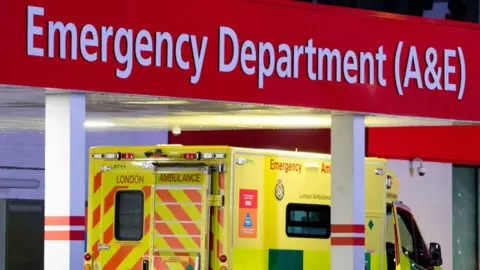Coronavirus: Long waits for hospital operations soar in England
 Getty Images
Getty ImagesThe disruption to hospitals in England during the pandemic has meant the number of patients facing long waits for routine operations has soared.
More than two million people on the waiting list - half the total - have been waiting more than 18 weeks, the highest since records began in 2007.
Some 83,000 have waited over a year, up from 2,000 before the pandemic.
But there are some encouraging signs, with treatments happening in hospitals on the increase.
- More than 140,000 operations such as knee and hip replacements were carried out in July, up from 41,000 in April when routine treatments were cancelled en masse. But that is less than half the level seen in the same month last year.
- The numbers coming to Accident and Emergency topped 1.7m in August, up from a low of 916,000 in April at the peak of the pandemic. Before the pandemic, more than two million patients a month were regularly coming to A&E.
- Nearly 21,600 cancer patients started their treatment in July, down from 28,000 in the same month last year. But that is up from 16,600 in May.
NHS medical director Prof Stephen Powis said the increase in activity was "pleasing", calling the rebound "substantial".
But he added: "The success of these service expansions depends on keeping Covid under control."
Big rise in waits of over a year
In March, NHS bosses announced virtually all routine work was to stop to create space for the expected surge in coronavirus patients.
Cancer services were meant to be protected, but some services were cut back on, while the drop in A&E visits was attributed to fear of the virus.
 Getty Images
Getty ImagesSaffron Cordery, of NHS Providers, said frontline staff were "working hard" to restore services.
She said the need for extra cleaning and constantly changing in and out of protective equipment meant it took longer than it did in the past to see and treat patients.
But she added: "The recovery from the peak of the pandemic was always going to require step by step increases in activity and the NHS is well on the way to restoring services. We are in a much better place than many would have predicted a few months ago."
But Prof Neil Mortensen, of the Royal College of Surgeons, said the speed at which patients were being seen was "disappointing", adding he feared many would have to wait until the spring for treatment.
"For those unable to return to work due to their condition, this is not only a health issue, but an economic one too."
Sara Bainbridge, of Macmillan Cancer Support, said unless more could be done backlogs would continue to grow.
"Behind each statistic is a real person whose prognosis and treatment options could be severely impacted by disruption during Covid-19."